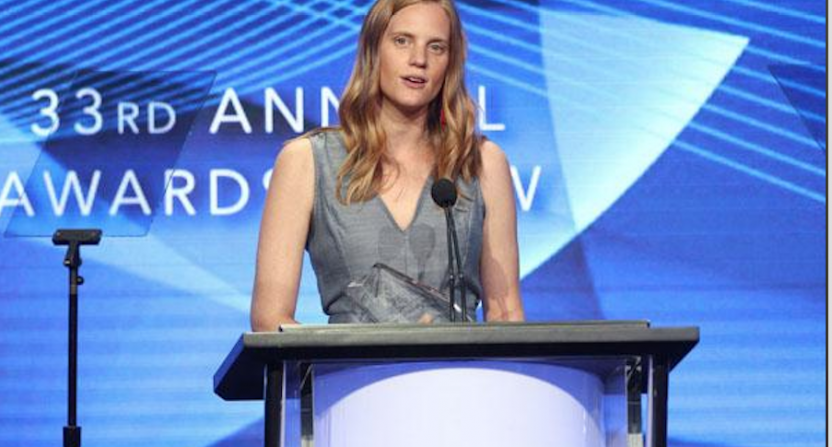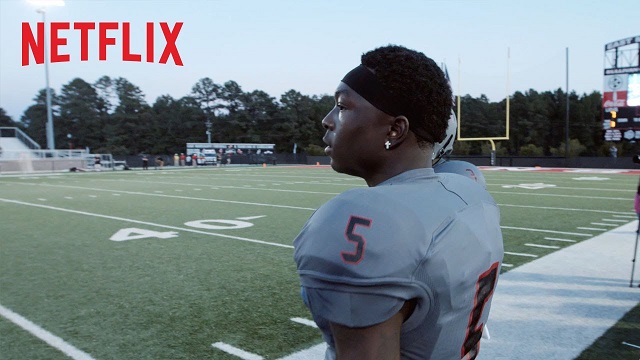Earlier today, I took a look at 30 for 30’s history and the off year the series is having in 2018.
For that article, I hopped on the phone with vice president and executive producer of ESPN Films and 30 for 30, Libby Geist. I used a few things Geist told me in that piece but I thought there was enough in our conversation to warrant publishing a full Q&A. Here are some highlights from my 30-minute interview with her with her answers only lightly edited for clarity.
Is it becoming harder to find topics for 30 30 that ESPN and other networks haven’t done yet?
With sports every day, there is a new story, so I don’t think we’ve run out in any way. I think we are definitely choosier than we used to be, but that’s not a result of not enough stories. I think it’s just that our bar continues to rise. We’re careful about the stories we tell, only because we want A) for them to be marketable and exciting to our viewers and B) I think we’ve done well with the culturally relevant stories and stories that have a little more layer to them than just “remember this Super Bowl story?” We’re really careful about making sure there is a layer or an importance to the stories we tell. Our bar is higher than ever and that’s made our jobs harder, but also better.
30 for 30 has a lot of diversity in terms of length, style, subject, etc. Should the series perhaps become more focused? How would you describe the series given it’s got such a broad focus?
I think 30 for 30s have been successful because they are all different. They all have a different point of view and director. We encourage everyone we work with to lean into their own style. I think the fact that people don’t know what they are going to get when they tune into us is kinda a good thing. So I’ve embraced the fact that these are different. You’ll hear in our upcoming slate that there are a few left turns that will surprise everybody, but I think that’s a positive and not a negative.
I think shaking it up and not feeling repetitive is really important and something we talk about all the time is not falling into the traps of easy storytelling, especially as we approach 100 docs. If they all start to feel the same or have a formula to them, I think that’s when people start to roll over or ignore us. We’re actually encouraging the people we work with to find their voice and have stuff look different and stylistic and a little bit weird and we like that.
Are there installments that, looking back, don’t fit within the collection or don’t live up to the 30 for 30 standard?
We feel good about the collection. There are certainly a couple that are more cinematic like Broke, that don’t feel like “Moment in Time,” but that was so well-known and well-done and well-regarded that we feel like our fans appreciated that for what it was. We feel good about everything we’ve done to date being under that umbrella.
ESPN had traditionally put out some of its best work after the Heisman ceremony or after the NCAA bracket show, but missed those dates last year and will miss the Heisman slot again this year. Will we see those dates return as signature dates?
We don’t know exactly, honestly. I can tell you that with the post-Heisman slot, there are live events and live rights that ESPN has acquired that are important to the company that we are also working around. I believe those are Top Rank fights, so we are coming up with a separate strategy aside from those two nights to release those in a big way around relevant games in the right season, just around other big events.
What’s your reaction that some within Bristol have conveyed to me that they don’t think 30 for 30 doesn’t make much business sense for the company?
We can certainly get research to you in terms of the affinity of the brand, and our business justification. I can tell you that we know for a fact that 30 for 30 is one of the strongest brands at ESPN. I think the halo effect that our group brings this company is unmatched. We have no fear about our worth and our value here. We know our executives appreciate what we do, especially in the age of ESPN Plus. We are the #1 reason people are subscribing to Plus and coming back to it. I think the library and the VOD experience of our 100+ documentaries are more valuable than ever. I’m not sure who you talked to, but this is a sort of golden age of what we do and the future of this company.
What sports documentaries outside of ESPN have impressed you?
I think there’s plenty of great work happening in documentary film, generally outside of 30 for 30, and we are proud to part of that community. I can tell you I think Last Chance U is remarkable. I also thought Senna changed the game in terms of what is happening in the sports documentary space. I could rattle off a million projects that we are fans of and wish we had been a part of.
On how and why ESPN brands certain projects 30 for 30 vs other documentary brands
We are treading that line carefully and I think we are learning as we go with every project. Again, what is a true 30 for 30, and what does that mean? You just alluded to the Last Dance, the Jordan thing. We haven’t talked at all yet about the branding of that. I think OJ was a 30 for 30 event ultimately. It’s certainly possible that the Jordan project will be something along those lines. We’re sort of doing it project by project right now.
What should we keep an eye out for going forward?
Keep an eye out for big stories. Right now in the world, there is just so much content and we are realizing that you need big names and big flashy stories that of course that have a lot of meat to them and have a lot of cultural relevance. They have to be a great story but also a big story. I think we’re being very hard on ourselves and very precious about what stories we green-light because we want to make sure people see them and talk about them. We’ve chosen topics going forward that we know are not only marketable, but also intriguing and exciting to our fans. I think we’re going bigger and better moving forward.








